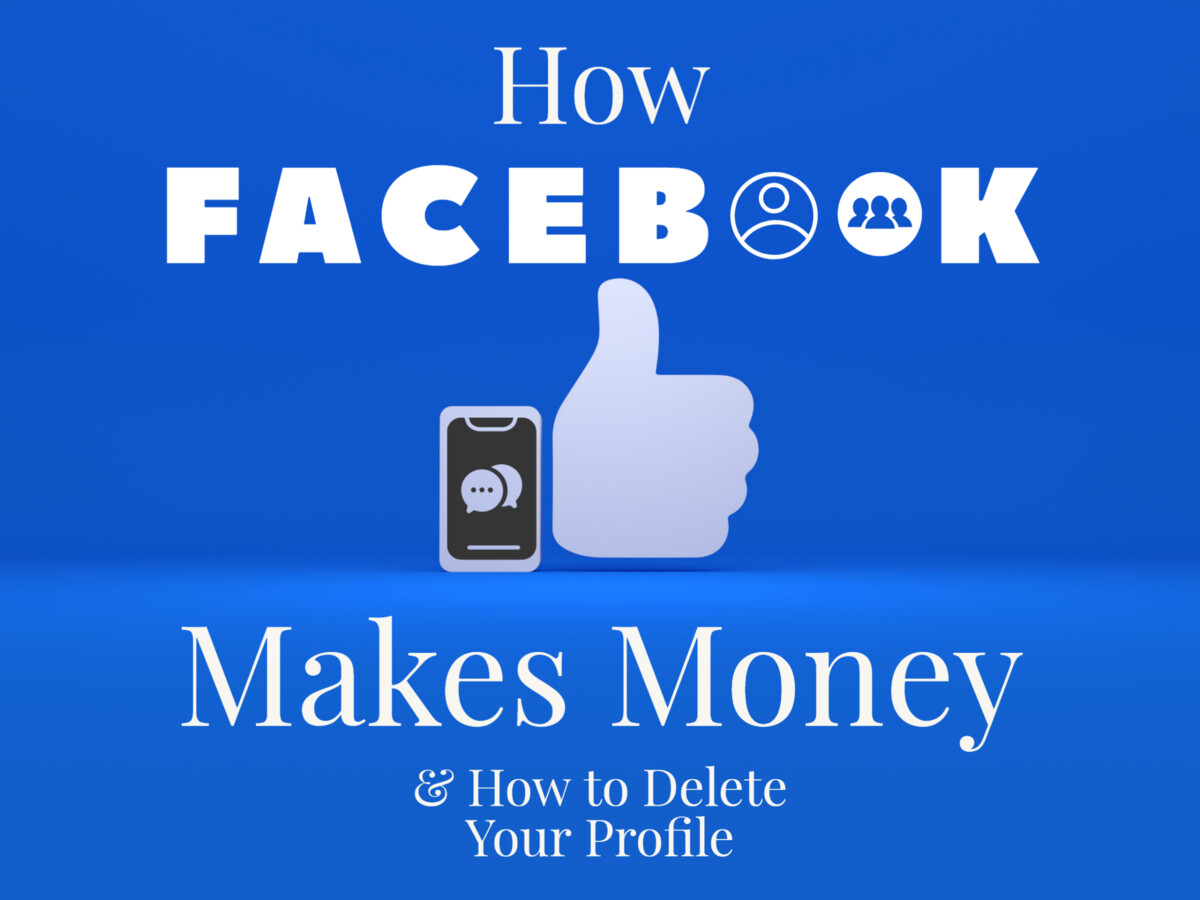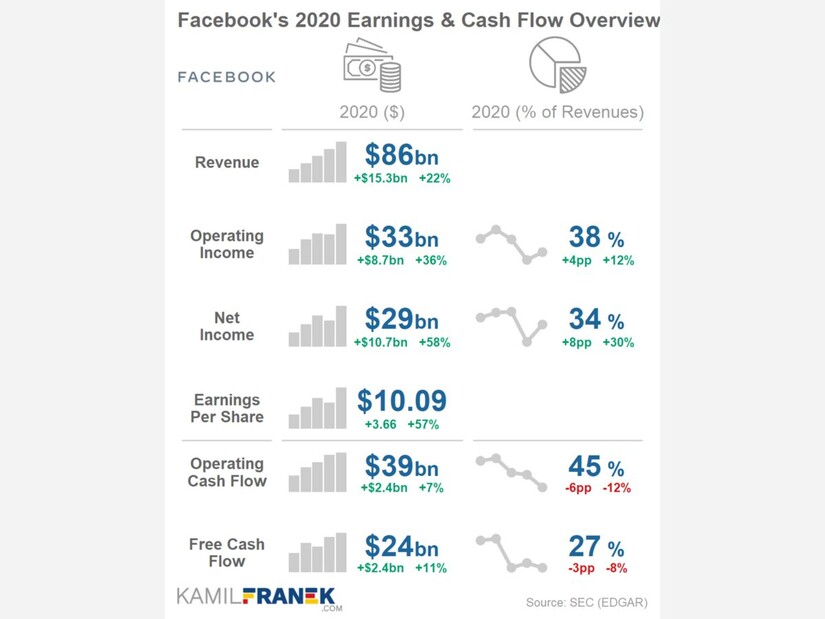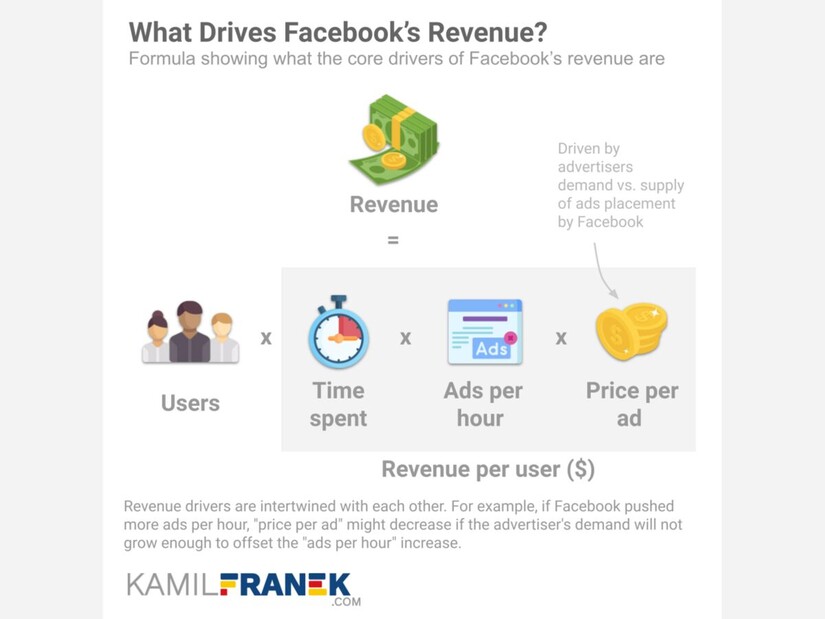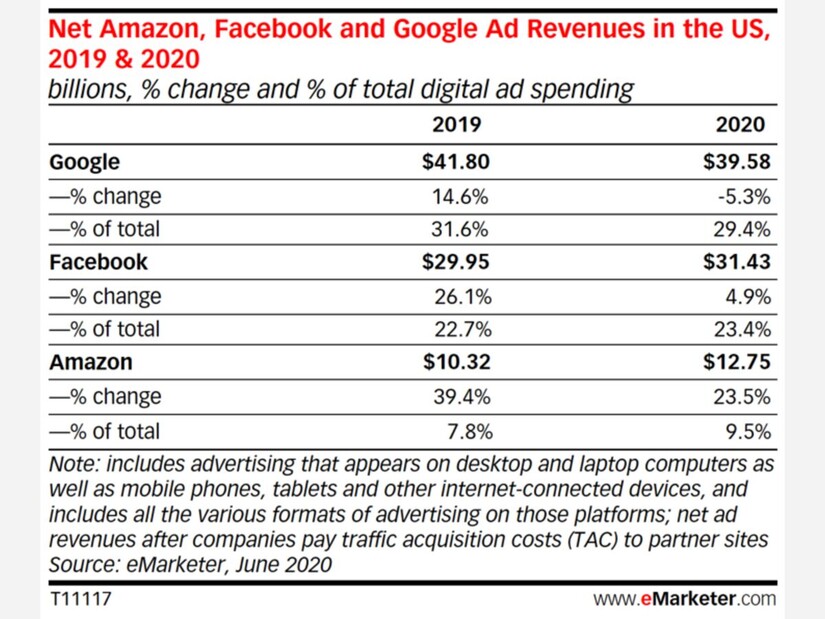Image


Mark Zuckerberg, CEO, founder, and controlling shareholder of Facebook (now part of the parent company rebranded Meta) started facebook with the vision of offering a free service to its users. To this day Facebook is free to users and the platform supports itself by auctioning advertising space to businesses.
In 2020, Facebook made around $86 billion in revenue, 98% of which came from advertising sales. The remaining 2% comes from retail sales of Oculus and Portal devices, and payment fees from developers.

When COVID-19 hit the world in 2019, most companies took a big hit, but Facebook's revenue grew 22% during the first year of the pandemic with a net income of $29 billion. It makes sense that during a time in which leaving our homes and visiting friends could lead to a debilitating and sometimes deadly disease social media sites flourished.
Facebook was one place people could interact with the outside world without fear of contracting COVID-19. However, as the pandemic raged on and more and more people turned to online social platforms, we began to realize just how harmful social media could be.
By now most are aware of the countless scandals involving our privacy, hate speech, and divisive content on Facebook. The U.S. government even questioned Mark Zuckerberg on live TV with a truly embarrassing list of questions.
The very much not tech-savvy 70+ year-olds running our government had no idea what to ask the social media mogul and spent most of their time trying to understand how Facebook makes money while it offers a free service to its users.
Mark Zuckerberg explained Facebook's revenue stream multiple times but probably puts it best here:
While our senators struggled to understand the simple revenue stream that profits many companies of the twenty-first century, they completely missed the vital question that is of true concern to Facebook users.
Facebook is a company, after all, and companies like Facebook have one ultimate goal, profitability.
We've all heard the saying, "the customer is always right." Although some may not agree with this statement, it is a philosophy that keeps companies profitable and Facebook follows this philosophy just like any other big business. Unfortunately, Facebook's users are not "the customer."
Yes, Facebook is free. And yes, they are a billion-dollar company thanks to advertisers. Therefore, Facebook's true customers are those advertisers, and the advertisers are always right. This means Facebook's interests lie in keeping advertisers happy.
Facebook, owners of Messenger, Instagram, and WhatsApp auction advertising space on their platforms, but the highest bidder doesn't necessarily win.
Facebook takes into account the bidding price for the ad spots as well as how often the ad is likely to be clicked on. Since Facebook charges advertisers by Price Per Click, it makes more sense for Facebook to give ad space to a lower bidder if the ad is likely to get more interaction in that space, and therefore make the company more money.
To determine the best placement for advertisements, Facebook collects personal information about its users such as their age, religion, ethnicity, interest, political opinions, relationship status, who users communicate with, how they react to content, pages they visit within, and outside of Facebook, and more.
With this information, Facebook builds a profile on each user that reflects an accurate depiction of who the person is and what advertisements are most likely to catch their attention. These profiles are accurate enough to be extremely valuable to advertisers and help Facebook continue to offer its service "free of cost."

Facebook can even estimate your personal profile using machine learning even if you don't share anything or interact on Facebook. Simply having a Facebook profile is enough for the company to profit from a user.
Over the past five years, users and advertisers have come together to demand Facebook intervene when content on the site becomes hateful or harmful. This is one area where the customers, i.e. advertisers, and the users' interests align.
Neither users nor advertisers want to be associated with or encounter hateful content. Because of this alignment in beliefs, Facebook has made significant moves to combat harmful and hateful content on its platform. This is just one example, of very few, when users' interests were heard and responded to in an adequate and timely manner. The bad news, Facebook only listened because money was on the line.
Facebook's mission is to collect as much data from profiles as possible without significantly alienating users so that they may more accurately charge and place advertising that will draw an actionable response from users and thus make money for the company.
Therefore, users are not exempt from any power over Facebook's profitability. On average, Facebook makes about $32 dollar from every user worldwide by collecting their information and selling ad spots to relevant advertisers. So for every profile they lose, the company is down $32 dollars a year in revenue.
This may seem like a small number, but the profitability of Facebook lies more in the hands of users than advertisers.
If Facebook were to lose half its users, the power they have to predict user behavior and place profitable advertisements would drop significantly. Whereas if Facebook were to lose half its advertisers, the site's profitability would be virtually unaffected.

Despite users having quite a lot of power in Facebook's revenue stream, the company routinely sides with advertisers over its users. Most recently, Facebook sided with its advertisers over the issue of privacy, and this is the main concern our senate was trying and failing to get at.
When confronted with the issue of controversy, Facebook elected to lessen controversial topics and posts on its site not because users called for it, but because advertisers didn't want to be associated with harmful posts.
You may have heard Facebook make recent announcements regarding the censorship of political posts. Mark Zuckerberg championed free speech at a talk in Georgetown where he said Facebook would always uphold users' first amendment rights.
However, behind the scenes, Facebook has done quite a lot of political censoring because advertisers, once again, don't want to be associated with divisive or harmful content. So despite Zuckerberg saying he'd uphold users' first amendment rights, the company ultimately sided once more with advertisers. Again, the customer is always right.
As previously mentioned, users may not be Facebook's primary concern, but we users hold a significant amount of power in determining the value of Facebook's ad space.
The only thing you need to know about big business is that money talks. Since Facebook isn't looking out for the interest or privacy concerns of its users, the best way to make a statement is to remove yourself and any data from Facebook's servers.
You can delete your Facebook online by going to "Settings" and then clicking "Your Facebook Information." Then choose "Deactivation and Deletion." At this point, Facebook will ask if you would like to deactivate or delete your account. Deactivation will make your profile no longer visible on Facebook but won't delete your information. Deletion will scrub all your information including any data Facebook has collected on you and delete it within thirty days.
Choosing to delete your Facebook is the best way individual users can send a message to this giant social media mogul and protect themselves from hacks, scams, and unwanted pursuits by advertisers.
In the era of online permanency, Facebook is not your friend.
Our reporters will be dedicating time and resources to investigating the roadblocks to mental health accessibility in our town.
Donate to Morristown, NJs local mental health accessibility fund today!
 Scan or click to donate!
Scan or click to donate!*The 2022 Local News Fund is a program administered by the Local Media Foundation, a 501(c)(3) organization affiliated with the Local Media Association. The program’s purpose is to allow independent and family-owned news organizations to solicit tax-deductible donations from their communities for journalism projects focusing on critical local issues. Contributions to this program are tax-deductible to the full extent of U.S. law; please consult a tax advisor for details.